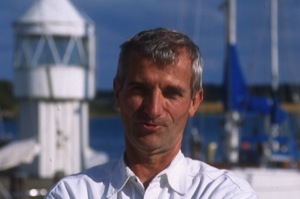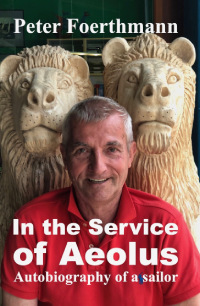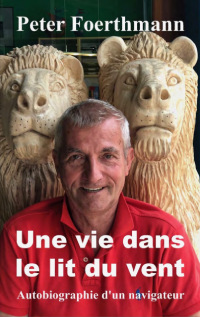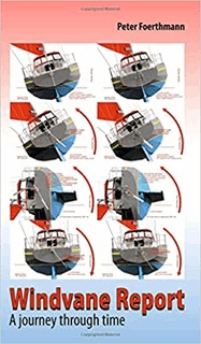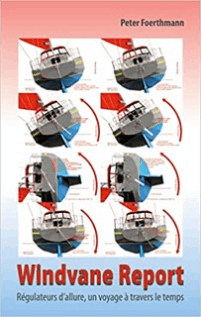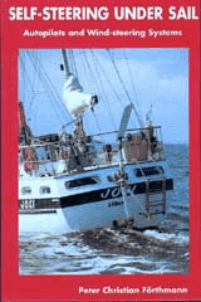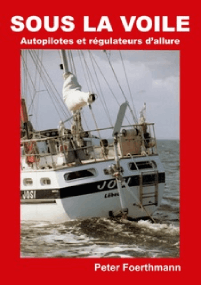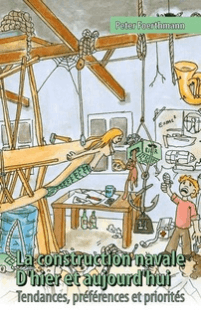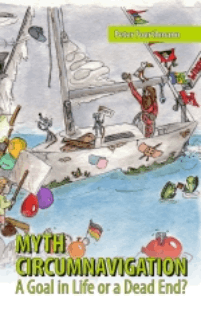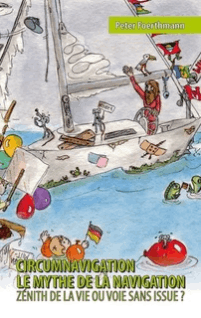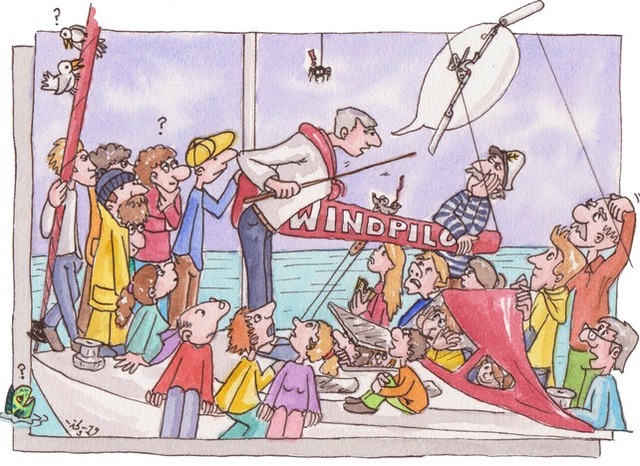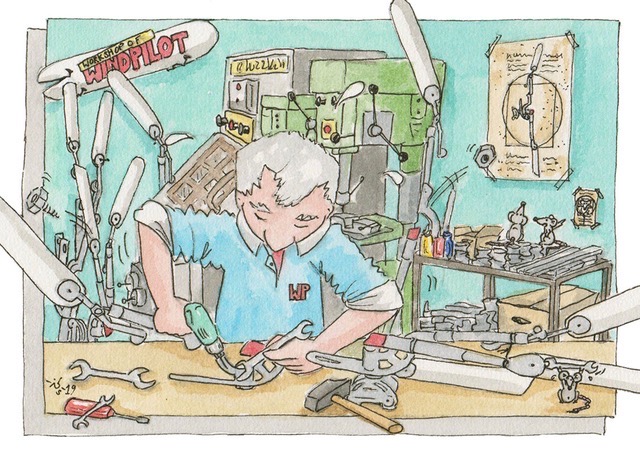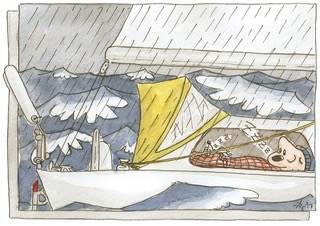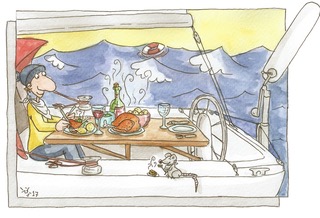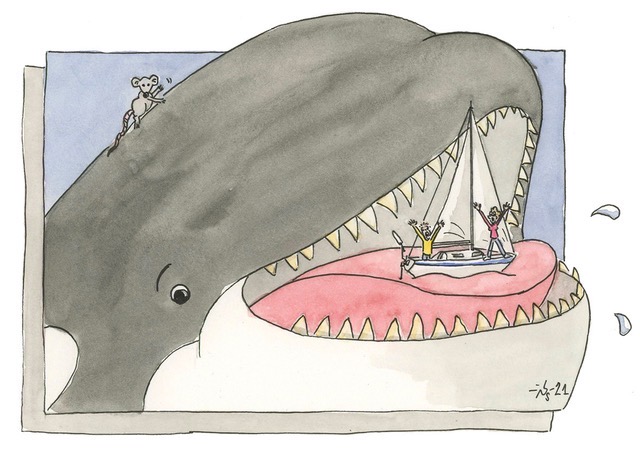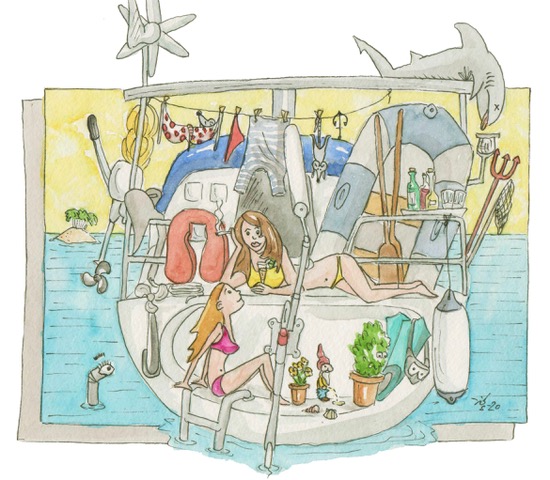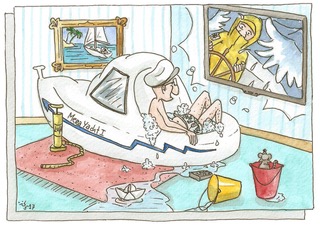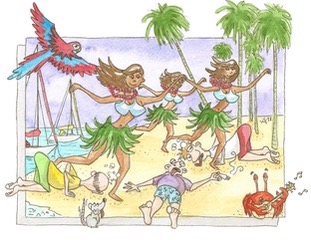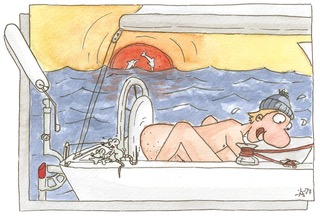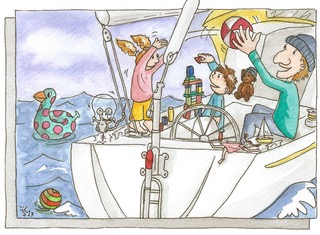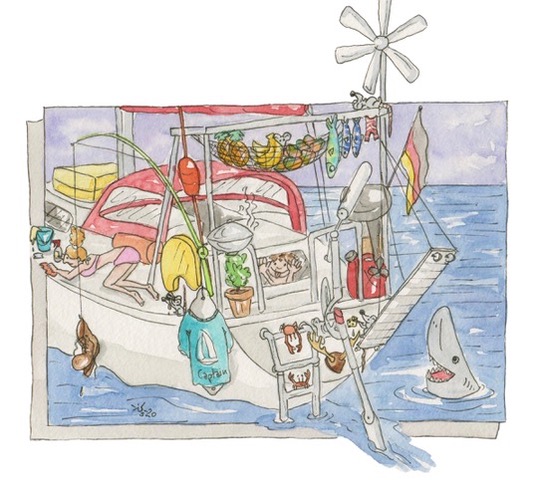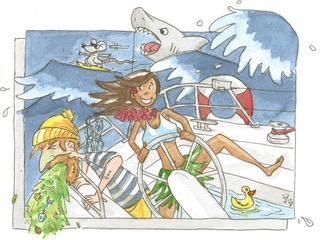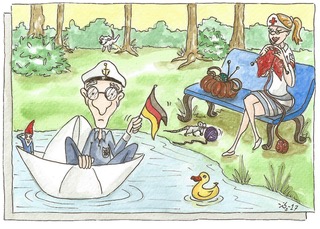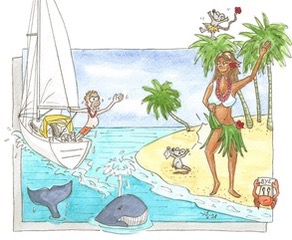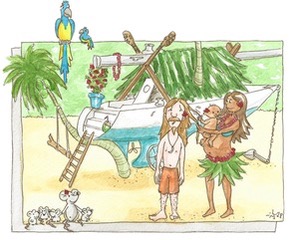MONETIZING BLUEWATER ADVICE
The 40 years I have spent in the windvane business have shaped the way I think and left me with a clear and obvious set of priorities. A self-confessed idealist, I allow myself the luxury of believing that there are some things that come before sales and profit – and I do so fully cognisant of the fact that this makes me something of an outlier (to say the least). My obvious independence is the wind in the sails of the word of mouth recommendations that circulate through the cruising community, enabling me to sell my products around the word with no fanfare and no need whatsoever to trouble – much less pay – the usual suspects in the media. Not surprisingly, certain ladies and gentlemen of the global fourth estate have taken umbrage at my approach because it runs counter to their system of creating dependence and subverts their business plan (salary plus perks), under which paid advertisements tend to correlate with editorial attention.
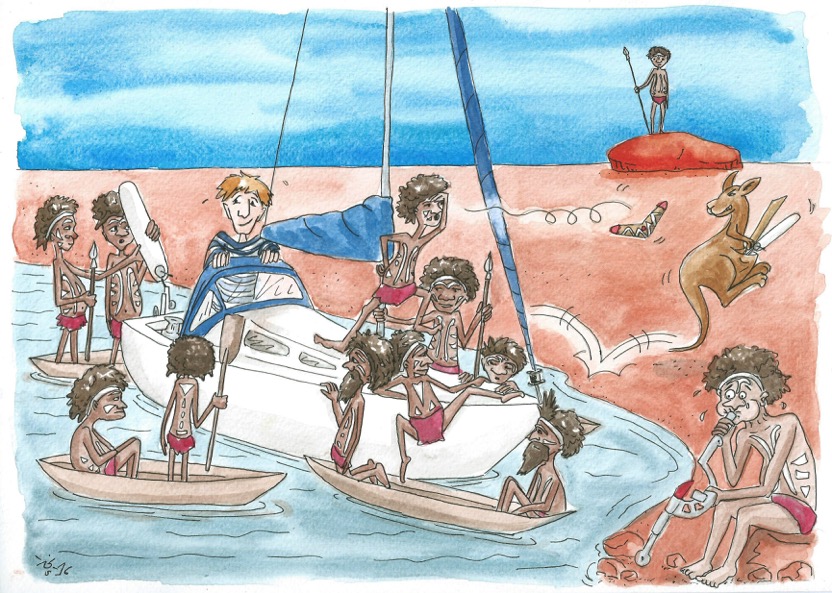
Mine is a niche business in which the expense of advertising internationally in magazines would have increased the price of my products exponentially without generating sufficient additional interest among sailors. Even before the dawn of the internet, I never felt the benefits would have come anywhere near justifying the cost. The proof is in the pudding: I sell my products worldwide without any conventional advertising and have stayed away from the global boat show carousel since 2003, which was also the last time I raised my prices (and keeping prices constant for over a decade turns out to be no bad thing in a competitive market).
So without necessarily setting out to do so, I have taken myself outside the bounds of accepted behaviour in journalistic circles and I believe it still rankles with some that I have no interest in buying “goodwill” to ensure I remain the dog and not the lamp post. Paying for good press has never seemed like good business to me: for all the fine promises of the people whose job it is to sell advertising space, we all know and understand that both they and the journalists they work to support are bound by a very self-evident set of inflexible rules – rules that in my opinion at least are unlikely to leave much scope for putting my interest before theirs.
Just a few days ago I received from French sailing magazine VOILES + VOILIERS an invitation to book an ad in an upcoming special issue about sailing two-handed in which, I was informed, the subject of windvane self-steering would command an entire chapter. The pressure to act quickly was on too: ads closed in just a few days! Strangely I don’t seem to have received any associated enquiries from the editorial team about my products or company and when I asked about this directly I found no answer forthcoming. Let me point out at this juncture that the French market is a big one for me. Hundreds of aluminium yachts from brands like OVNI, ALLURES, GARCIA, BOREAL, META, VIA, etc. have been and continue to be fitted with my systems, some of them even as part of the initial fit-out at the yard. My book on self-steering, TOUTES SAVOIR SUR LE PILOTAGE AUTOMATIQUE, has been a popular reference source for 20 years and has ensured, together with quite a number of spectacular voyages by well-known sailors, that the Windpilot name is both widely known and highly respected. It’s the same old story: nothing beats bouche-à-oreille (word of mouth).
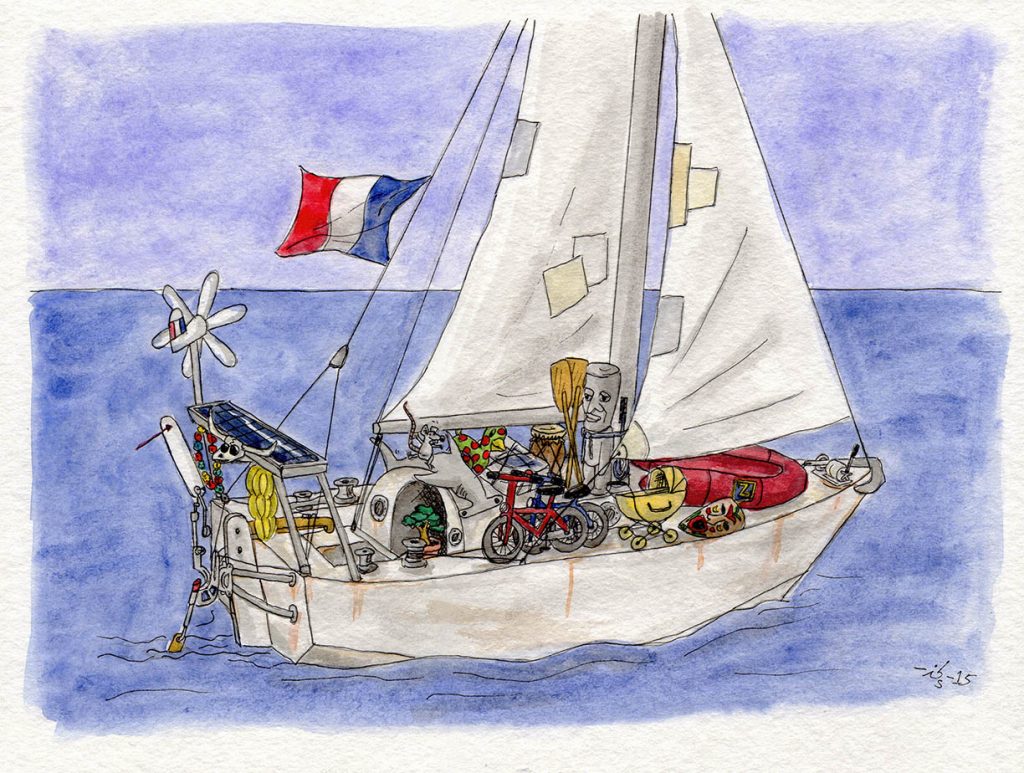
IT´S ALL ABOUT THE AD
The powers that be behind our magazines appear to operate under an unwritten rule that begins and ends with the advertisement. Buy one and you are on the radar and in with a chance of publicity, perhaps even praise. Keep your hand in your pocket, on the other hand, and you simply don’t exist. A recent “Hamburg Special” published by an outfit billing itself as Europe’s biggest sailing magazine somehow overlooked the long-standing presence in the city of a leading global player in the windvane steering market. Surely they must be shooting themselves in the foot with this sort of glaring omission. Little occurrences like these collectively betray to us a great deal about the constraints within which the people behind them are compelled to operate. Objectivity, it seems, has its price.
Why do I always get the impression that the nautical press is in a constant struggle to justify its own importance? There’s just no need for this to my mind. We all (please say it isn’t just me) need our regular dose of tales of heroics afloat to feed the soul and keep those dreams of gently swaying palms well-watered. The glossy sailing magazines do a fine job of meeting this need by bringing together a wide range of interesting material (including plenty of beautiful, tantalising photos) to nourish our fantasies and supplying this material to us for money. And magazines certainly know how to do fantasy: sailors get their sailing porn, classic car lovers get their classic car porn, trainspotters get their train porn … and for those with less imagination I expect there is even still regular traditional topic-free porn.
I have gone my own way, something I managed to do comfortably for decades without rubbing the press the wrong way thanks in particular to the fact that there used to be much more understanding of the synergies to be gained from expert knowledge.
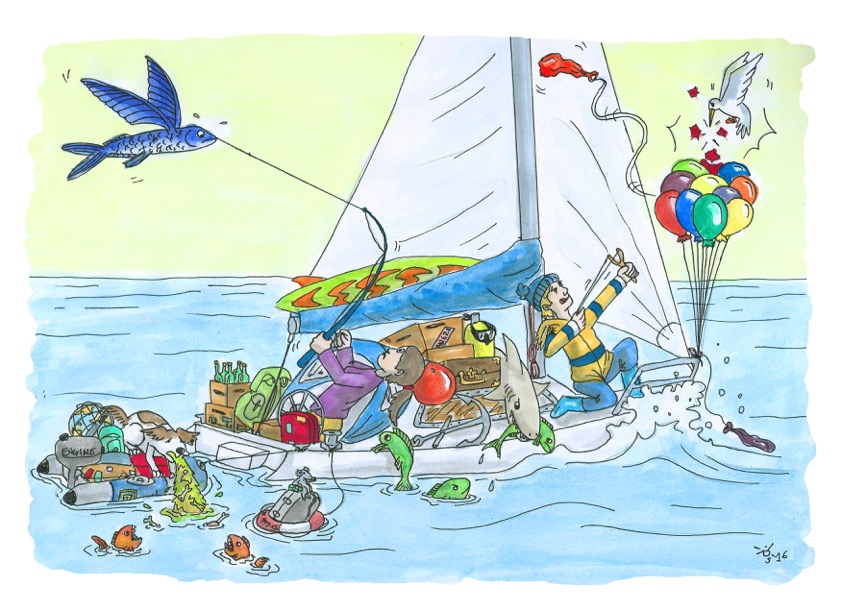
Changes in personnel at the top, pressure to rein in costs, new faces and new priorities – I think perhaps some of the journalists sniffing around for interesting new fields to explore in print may in their enthusiasm have allowed a decades-long equilibrium to be compromised and, bing bang boom, met with the “Peter’s considerations” section of the Windpilot website. What was – and is – it all about? Well, nothing less than a (to my mind wholly absurd) controversy about who has the authority to advise and counsel the very smallest group of German sailors, namely the bluewater community, whose dreams, plans and experience lend impetus to an entire sector for the simple reason that every sailor, no matter how small their pond, knows what it is to dream the dream.
The very specific questions and concerns regarding equipment and training for the Big Trip are of direct relevance only to a tiny market, but the sailors who make up that market have more than the average share of drive and personal conviction, are hungry and enlightened in equal measure and make their decisions with the meticulousness and prudence that come with knowing that one mistake can have wide-ranging consequences. What this particular group of people need more than anything in their preparatory phase is clear and knowledgeable advice.
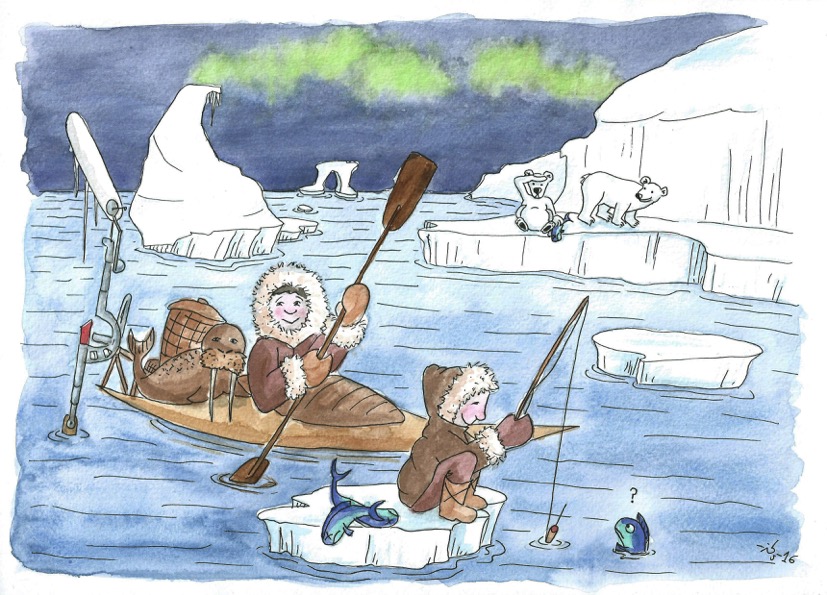
PRINCIPLES
To what extent can specific or even dedicated advice guide the thought and decision-making processes that go on in a sailor’s head? Are wise mariners capable of generating their own opinion? Can bad advice actually be damaging? Rhetorical questions all: the answers should be plain to see.
I believe competent advisors, ideally not compromised by the need to stimulate sales, are the best way to communicate complex material. This in fact is one of the reasons I fought so resolutely to try to ensure the wealth of German bluewater sailing experience that previously belonged to a certain association in Cuxhaven would be available free of charge – pro bono – to other sailors and association members. Other people apparently had other ideas.
It seems obvious that increasing monetisation of the bluewater seminars cannot help but have serious consequences for the quality of the advice presented. Allow me to consider the implications in detail.
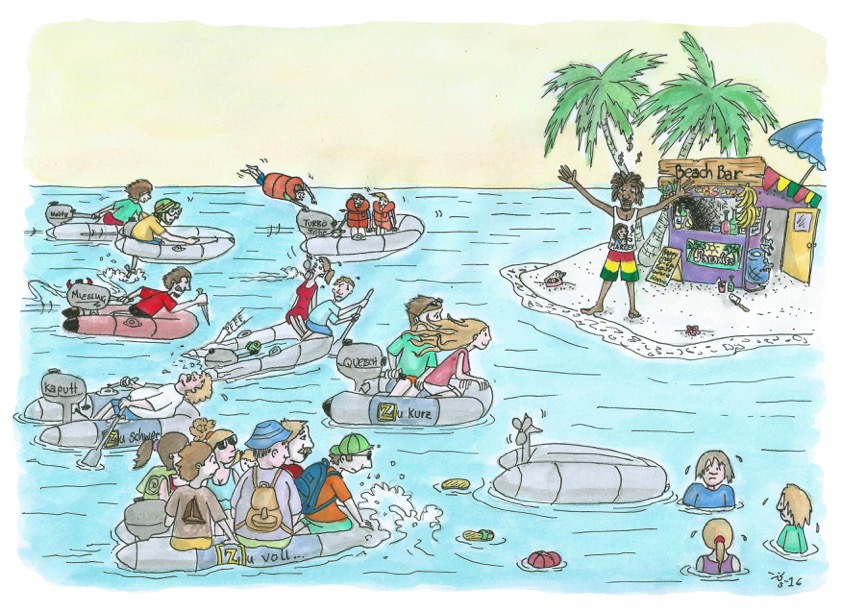
TTHE PILLARS OF INFORMATION PROCUREMENT
WORD OF MOUTH – BOUCHE A OREILLE
WOM has become the most important marketing tool bar none for the global sailing community. Opinions, experiences and customer satisfaction are disseminated throughout the community authentically and without artifice – a wonderful reference delivered at the click of a mouse, straight to the target and without costing a penny. But what makes word of mouth the non plus ultra for customers also makes it a long and arduous challenge for manufacturers: earning what cannot be bought takes energy, endurance and sometimes a measure of humility as well. It took me decades of work to bring Windpilot to the position it now enjoys.
SPONSORSHIP
Using brand ambassadors to spread the word can seem like an attractive shortcut, which is undoubtedly why it tempts so many. It takes a born gambler to thrive in a game that demands so much up-front investment when the results are so difficult to foresee and the possibility of the substantial sum wagered disappearing into unhelpful pockets cannot be ruled out. We all know very well how easy it is to create a natural preference for a product by ensuring its name is heard regularly in the right settings. Brand ambassadors for everything from shampoo to the autonomous soapbox have conquered the world; sex, beauty and spectacle have all become a means to a marketing end whose efficacy is beyond doubt. All the world’s a billboard.
Sponsoring a sailor is in theory the cheapest way to gain access to the value chain and launch a name out there to be repeated, spread and burnished by the public. Sponsorship can go spectacularly wrong though: the Bernt Luechtenborg story tells us everything we need to know about the potential pitfalls! The magnitude of the support provided speaks volumes about the perceived worth of the sponsored sailor (sometimes in a less than entirely flattering way). Every penny counts for the recipient though, so even a trivial contribution is likely to earn a polite public thank you online. Does everyone involved – sponsor, sponsored, media and consumer – share the same understanding of how the arrangement really works? I wonder…

THE KNOW IT ALLS
It is no secret that every sailor started small. Even the most experienced bluewater salts and circumnavigators have gaps in their knowledge that they fill with the help or support of relevant experts (now commonly known as the “shore team”) in order to keep the show on the road. No sailor can afford to pass up the wisdom these experts have to share: quite simply they are a part of a successful voyage. Nobody fell from heaven armed with absolute mastery of bluewater sailing and certainly nobody will ever be in the position to acquire complete mastery of the subject down here on Earth. Circumnavigators generally view their technical equipment as nothing more than one tool among many: it needs to work for the duration of the trip and that is all. The specialists on whom they rely for their technical support, on the other hand, are usually career experts who have dedicated the best part of their working life to the subject.
Now and again a sailor at the end of a circumnavigation will pick authorship as his or her next challenge. Reading between the lines of the books that ensue can be an interesting experience: sometimes expert knowledge born of other heads is presented in writing as the author’s very own and suddenly – occasionally even overnight – a new fount of all knowledge appears. I consider it to be one of the unwritten rules of respectful human interaction that sources are acknowledged. Giving credit where credit is due does not in any way diminish a sailor’s achievement, but it does show appropriate appreciation and respect for the generosity of the people who contributed their technical expertise to the project.
The second question we have to address in our present deliberations is how objective we can expect our sailor-authors to be in print if their experiences have been at least partially enabled by “support”, in cash or in kind, rendered before pen met paper? Can this be accepted, or are those advertising banners the first step in a seamless process to turn advisory services rendered into cash when book meets reader? Once again there is a logical answer to the question.
So is the book and seminar business any more than just another link in the value chain? The more I try to put my thoughts in order, the more uncomfortable they become. All of the indicators suggest commercial interests are very much in play and that objectivity could very easily fall by the wayside. The relationship between author, publisher and manufacturer is undoubtedly a thorny issue on several levels. How do opinions come into being? Who pulls the strings – and who dances when they are pulled?
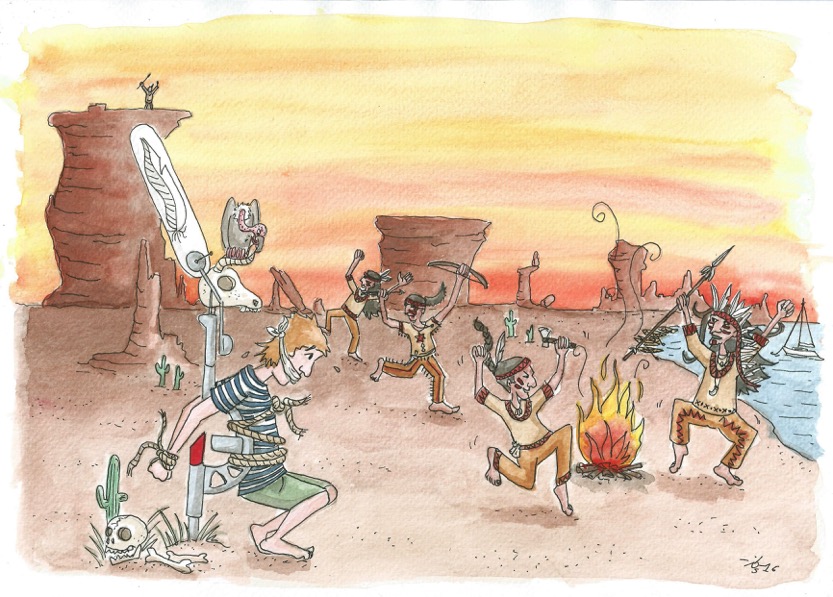
THE MEDIA
The capacity to disseminate opinions confers a power to which we are all subject. And the powers that be have a clear interest in exercising it for financial gain. Opinion and vested interests can readily be combined to pave a smooth path to profit, the boundaries between press-pack reporting and marketing dissolving to the point at which they become invisible – or we become blind to them. Barely the tip of a dorsal fin shows above the surface but down there underneath, the jaws are snapping and the tails are thrashing in a bloody fight for influence, money and power – in any order.
The key to spreading a message (or in this case building brand awareness) is financial investment, a fact established page-fillers are of course happy to exploit in order to increase their own power – or should that be in order to help justify their existence? The idea of collaboration between the press pack and the book publishing houses is truly a clever one, creating as it does synergies ideally suited to improving the bottom line.
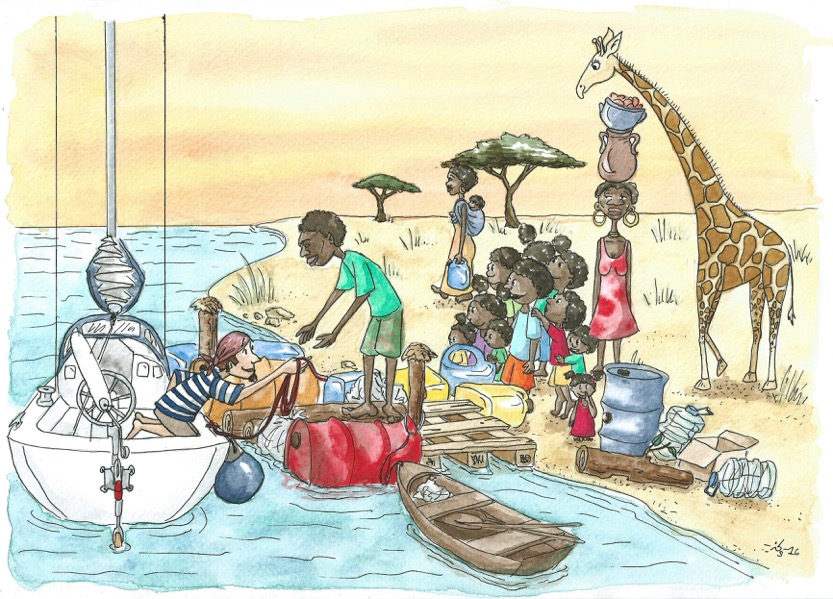
TRANS OCEAN, THE DISASSOCIATED ASSOCIATION
Clarity and competence of advice are really the crown jewels of a not-for-profit association whose primary mission should consist of educating its members and enabling them to tap into its cumulative experience. A commercial publishing house, with its economic imperatives and financial requirements, has no place in this relationship and an association established to serve its members has no business monetising what should be the shared assets of those members.
The controversy surrounding German long-distance sailing association TO originally flared up over an unseemly stand-off about who makes the decisions for the association. Such an organisation should exist to serve its members and follow their wishes, but this one does not, choosing as it does to align its interests with a publisher and apparently allow the interests of its members to fall by the wayside.
FOR MY PART…
An association with a crystal-clear identity could have been the perfect body to organise bluewater seminars. Quite immune to any suspicion of pursuing financial interests, it could have done the sailing community – and its own reputation – a world of good. This unique opportunity went begging because there were obviously plans in place to tie the association’s interests in with those of a publishing house instead.
SO WHAT NEXT?
As I see it the logical next step would be to reach for the stars, to stake out a role as THE oracle and touchstone for German bluewater sailors. Why not, when the best-known sailors have been snapped up (subjugated?) as house authors for decades? That would leave just one more step required to capture an almost universal fiefdom: gain influence (or should that be annex?) of a bluewater sailing association whose members – a self-selecting group ripe for targeted advertising – can be reached directly with a special interest newsletter incorporating bluewater-specific ads and, among other content, marketing pitches for books. And all of this comes, of course, with address details and monetisation of the bluewater seminars to realise synergies across all areas of the market.
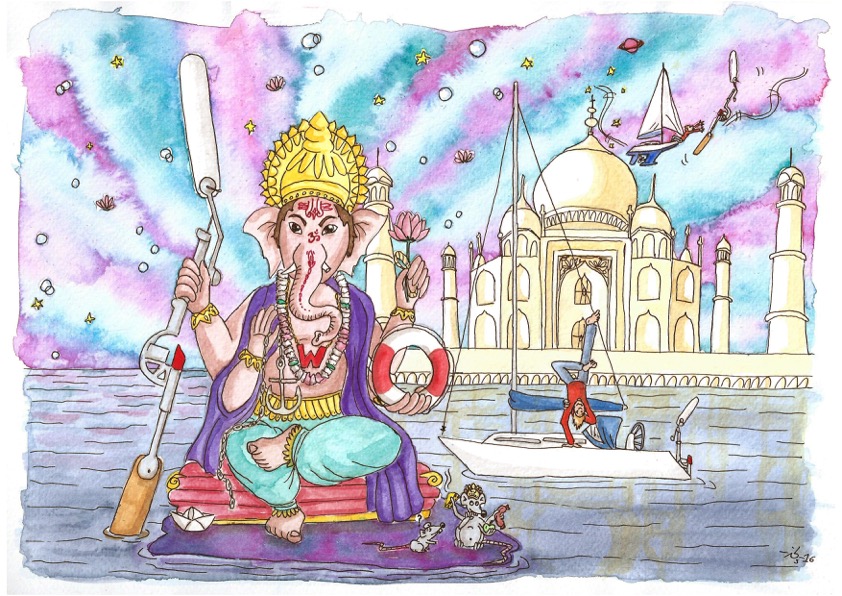
BLUEWATER SEMINARS
When I joined with Astrid and Wilhelm Greiff (of the German office of the World Cruising Club) 18 years ago to trademark the “WORLD CRUISING DEUTSCHLAND” name as a brand for our seminars, we always paid our speakers DM 500 per presentation. Jimmy Cornell notably declined any sort of payment in order to maintain his independence (as the initiator of such events he had a particular interest in preserving their credibility).
The monetisation of the seminars was one of the consequences of the change of ownership at the top of World Cruising at the start of the millennium. In the Jimmy era, it was common practice for years for support providers (including me) to be on hand to assist sailors in port free of charge, receiving in exchange the opportunity to report to participants in their particular field of expertise.
Recent years have seen this arrangement turned on its head: now support providers are expected to cross the organisers’ palm with silver (GBP 5000 it would be for me) for the right to attend to customers in need of assistance. I had always considered my in-port service visits as an implicit endorsement of the event organisers – an endorsement Jimmy had always clearly valued – and it struck me as particularly perverse that providers should now be charged to help the very customers who make the event happen. My autumn sojourn speaking face-to-face with real sailors about to take the plunge, a regular fixture from 1976 until 2007, also presented me with a great opportunity to learn about their experiences while sharing my own and I would like to think all sides benefited significantly.
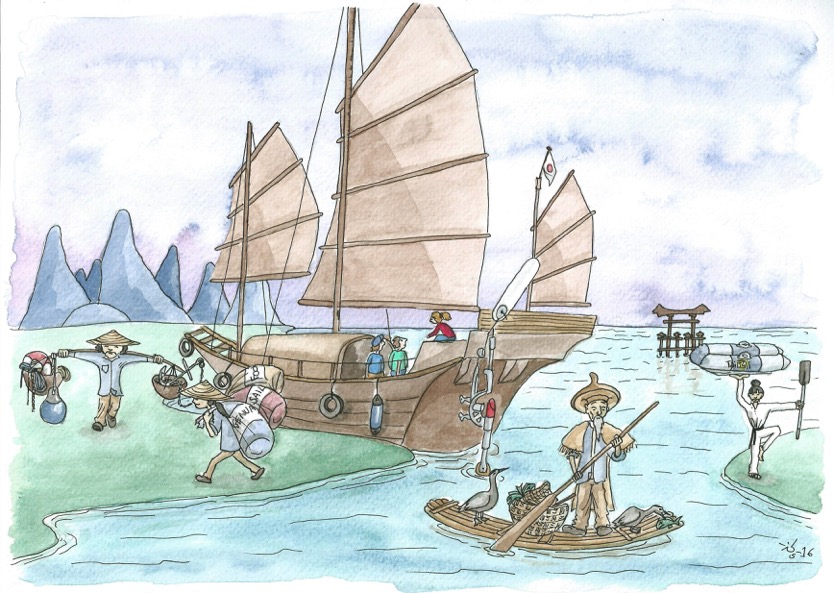
PAY TO PLAY
Following World Cruising’s decision, it quickly became the absolute norm to charge speakers for access to specialist seminars. My refusal opened the door for my fellow windvane provider Hydrovane, whose new owner in Canada was then able, on payment of the requisite consideration, to deliver his very special marketing message in person – a marketing message, it has to be said, for a system whose inventor and previous owner, Derek Daniels, had not long before invited me to buy his business (an offer that stemmed in part from his belief that his own product was increasingly unable to compete effectively with mine).
My new competitor apparently viewed paying for the right to address his target audience directly as a move that ought to make financial sense. But did the whole thing make sense for the people persuaded to buy his systems? I found I could never quite set my mind at rest on this issue: several times over the course of subsequent ARC events I saw yachts equipped with auxiliary rudder units the sight of which left me flabbergasted (see also the Great Atlantic Gear Test Atlantic gear).
It is difficult not to speculate, in summary, that pay to play benefited the organisers and support providers while the sailors in this specific instance found themselves on the receiving end of a rather stronger than usual message about the importance of emergency rudders. Emergency rudders can be a topic worth talking about, but it takes a certain strain of marketing genius to suggest judging the overall utility of a windvane steering system on the basis of its purported suitability as an emergency rudder.
Do I regret refusing to pay a support provider entry fee? Not in the slightest. Not once in decades of visits to Las Palmas and other gathering places of the bluewater crowd in the name of Windpilot have I ever sought to buy or pressurise my way to opportunities. My job has always been to share advice and help sailors get the best out of their windvane no matter who sold it to them. That I might on occasion find myself taken advantage of by less scrupulous sailors in need of a handyman was a risk I was prepared to accept, but there were limits. One day the lady owner of HR 49 on which I was tweaking a vanegear decided to ask me if I could just check the oil in the engine too while I was at it. I wasted no time (or pleasantries) in assisting her to understand that engines were not the reason I was there and by the end of the same day I had decided there would be no more complementary service visits for me. I was 63 years old at the time.
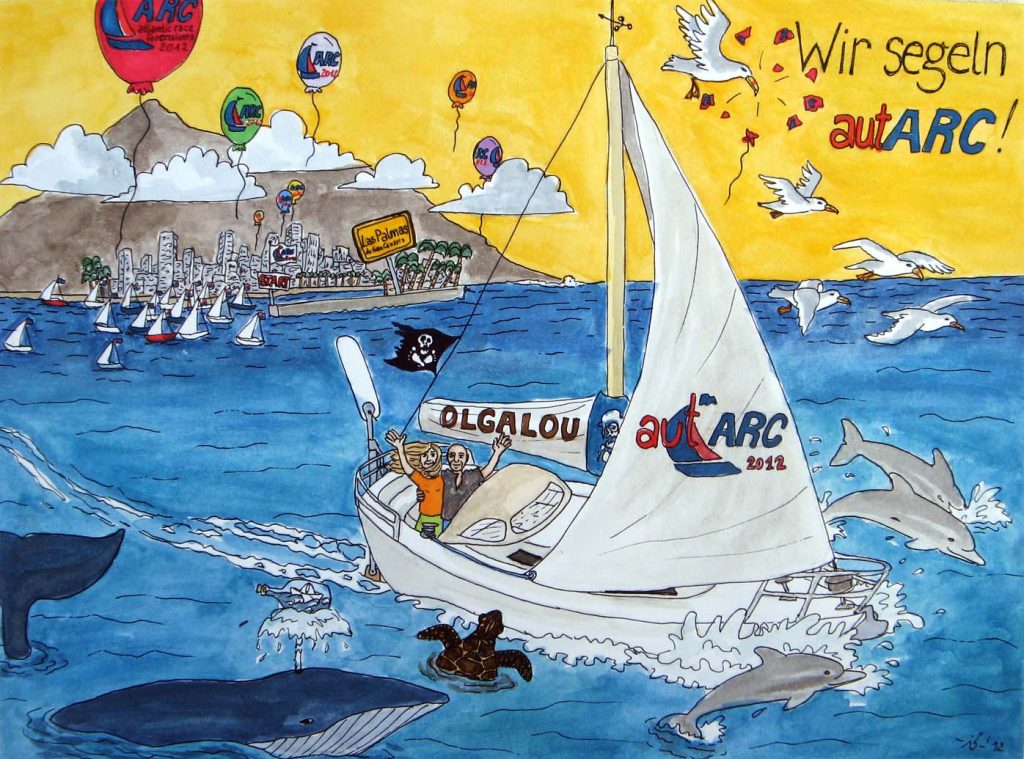
It seems to me that the seminar business has lost its innocence since manufacturers began having to pay for access to a public in search of advice and the right to discuss their products. The recent Bluewater Symposium hosted by Germany’s YACHT magazine exemplifies my concerns: never have I seen such an intensive promotional campaign. Some of the event supports even shared a portion of the costs. If we should decide, out of benevolence or naivety, to give the organisers the benefit of the doubt, the symposium drew “an audience of almost 70”, so not an overwhelming return on a veritable hurricane of media hype. The various plausible explanations for the unimpressive turnout, which was in reality probably somewhat short of the figure announced, include the high price of entry, the venue and, naturally, the football. But perhaps I should put forward another possibility. Is it not conceivable that we are seeing the chickens coming home to roost after the misdeeds of the organiser and “its” sailing association in Cuxhaven at the expense of the German bluewater community? I feel pretty sure that none of those involved will have the courage to think this possibility through – otherwise they might have to admit that our sailors are not as daft as they would like to believe.
Overall it seems clear to me that the potential for bluewater seminars is being overestimated, especially given the similar events that already take place every year in Dusseldorf and Friedrichshafen. I would put the total number of sailors interested in seminars of this nature at just a few hundred a year, although many sailors will visit several events.
Compared with the global cruising community, the German bluewater division remains a charmingly small group of people – which makes it all the more surprising to see jealousies, conflicts and rivalries played out in public, at times in a most unseemly fashion, again and again. I have vented enough on the Trans Ocean issue, so all I will add here is that the public fiasco continuing to unfold at TO HQ in Cuxhaven is an utter embarrassment for the German bluewater scene.
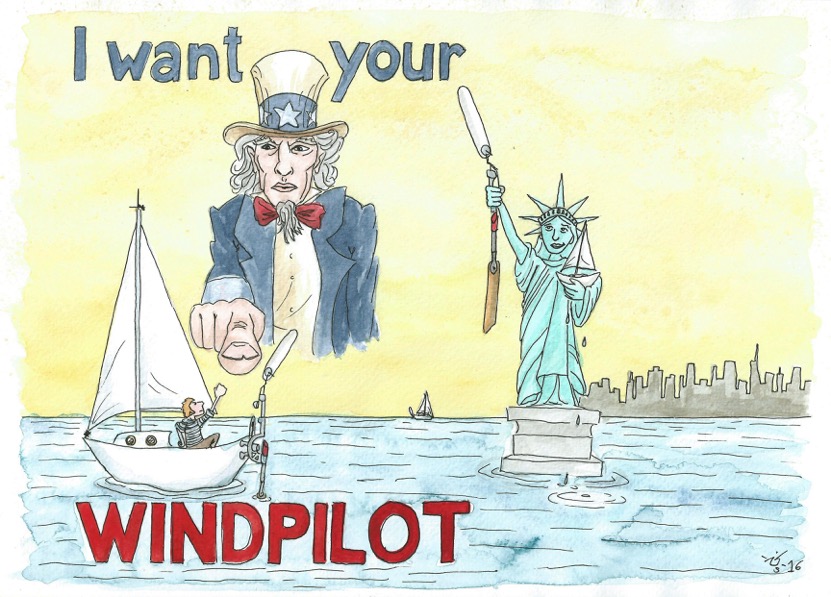
I have the luxury of observing the pitched battles for air superiority and market share from a distance thanks to the fact that Germany has long accounted for only a small part of my own business activities. The perspective afforded by this distance gives me a view I find most troubling. The advice business, it seems to me, has developed a momentum of its own such that technical expertise increasingly plays second fiddle to vested interests. Too idealistic? Undoubtedly – but a situation in which the cost of sponsoring equipment can effectively be the price of entry to a chain of marketing exposures offers little comfort for those who (with logic on their side) would put competence before marketing budgets.
If mentions regarding technical matters in books and seminar presentations come as the quid pro quo for prior services rendered (in cash or in kind) and if the absence of such a sweetener potentially means important information is omitted, does the concept as a whole have any value at all? Expecting an intellectually rigorous readership or audience to swallow this sort of arrangement strikes me as one faux pas too far and it is surprising – not to say troubling – that anyone was prepared to take this risk.
If YACHT magazine and the Trans Ocean association want to surf a media wave of their own creation to try to build a business empire in the bluewater sailing segment founded on their supposed competence in the relevant issues, all I would point out is that the facts are rather incoherent and the contradictions difficult to overlook.
Sailors tend to be among the sharper knives in the block, a group accustomed to gathering their own information and reaching their own conclusions. I find it disconcerting when unwritten codes of respectful interaction are set aside, especially when the group of people on the receiving end is so small and so discerning. So thoroughly acclimatised have I grown to my own position outside of this whole system that it makes me genuinely sad to be reminded of the mutual back-scratching that goes on elsewhere in our field. Time and again, however, there is no overlooking the fact that balance has been lost.
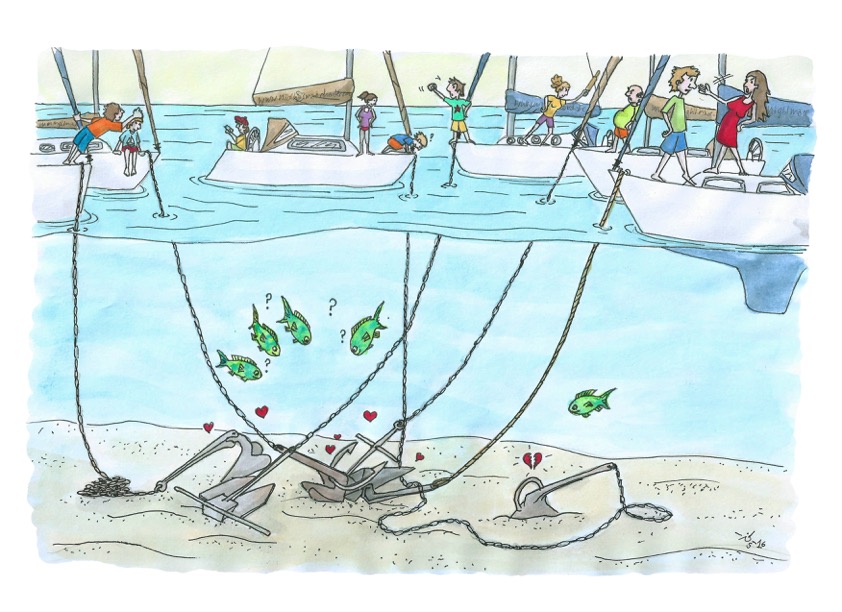
THE DREAM
How would things look if it were up to me? I would like to see bluewater seminars that are inexpensive or even free for sailors to attend, that are limited to trusted speakers who know their subject inside out and that are presented by an organiser that sends its speakers out onto the stage without charging them for the privilege. Such an event would be a big draw for a boat show, for example, as it would be open not just to the elite but to the whole of the sailing community, which would in turn have one more good reason to visit the show in the first place. I would anticipate significant synergies from this approach because it would provide a way to attract new target groups into sailing – people who, while not necessarily already planning expansive bluewater adventures, are nevertheless open to the idea and ready to be enthused. Surely it’s worth a try?
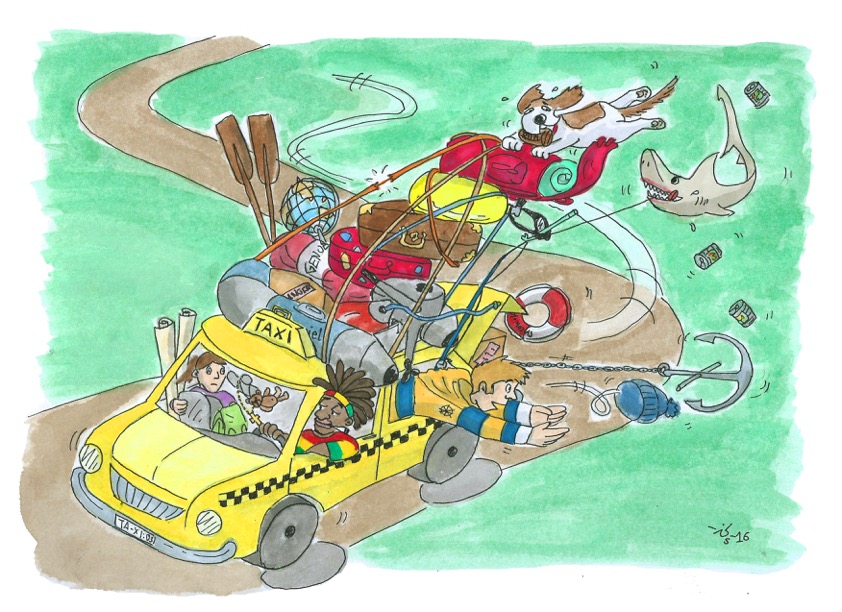
Actually this approach has been successfully employed for decades in the US, where boat shows offer an extensive programme of seminars. Anyone interested can easily reserve a space for selected presentations for so long as there are still seats available in the venue. The seminar programme ranks as one of the principal draws for many visitors.
Allow me to clarify: I am fortunate enough to have found a niche that brings me fun and financial independence and enables me to enjoy life, so envy is absolutely not my thing.
Any notion that the concerns I have outlined above can be dismissed on the basis that it’s a perfectly good system that happens not to benefit Windpilot is the reddest of herrings.
At least that’s how I see it,
observes
Peter Foerthmann




